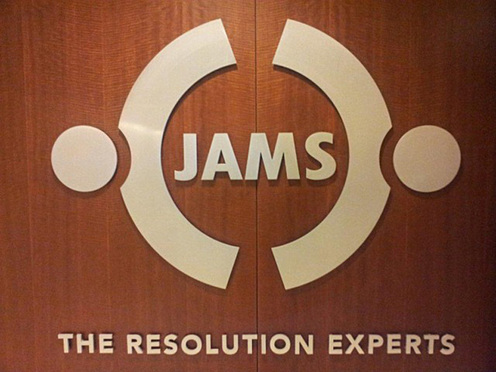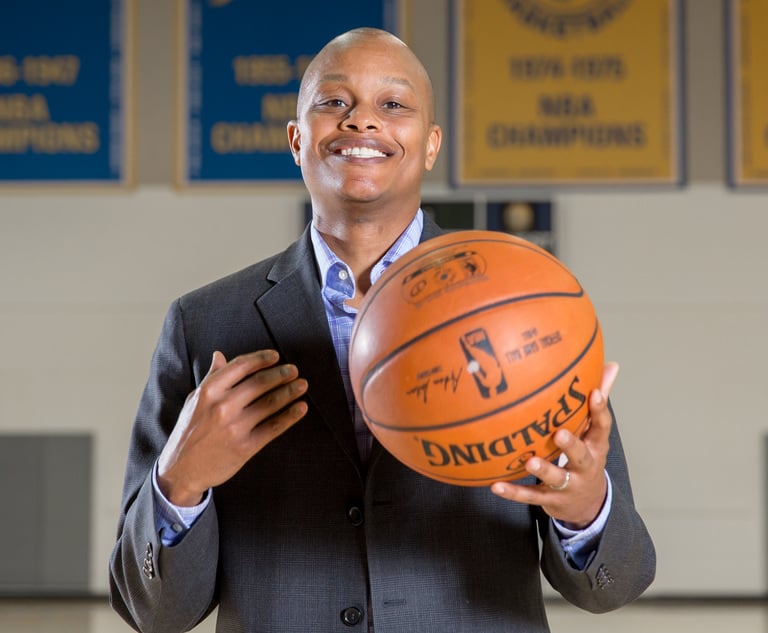Arbitration Innovation? JAMS Preps for Future Blockchain, Crypto Disputes With New Practice
The ADR group's new practice leader is Zeichner Ellman & Krause CISO Daniel Garrie, who argues “you need to change the rules” of disputes for new technologies.
September 06, 2018 at 06:36 PM
3 minute read

Blockchain is poised to reshape the practice of law, and dispute resolution is no exception.
Alternative dispute resolution group JAMS, which made a name for itself in tech circles as an e-discovery mediator, is trying to get ahead of the curve, launching a practice that specifically focuses on issues involving cryptocurrencies, blockchains and smart contracts.
The practice is placing a particular emphasis on the creation of protocols specifically for disputes involving blockchain, a technology that has featured in litigation particularly around cryptocurrencies, as well as in the practice of law via contracts.
A release announcing the practice group was largely mum on the specifics of such protocols. However, JAMS neutral Daniel Garrie, a key participant in the practice, told The Recorder the group is “having conversations with several corporate players and a new court project that are evaluating and looking at them.”
Likewise, JAMS senior vice president and chief legal and operating officer Kimberly Taylor mentioned “behind-the-scenes” conversations for developing protocols applicable across industries.
Describing the focus of JAMS' efforts around blockchain in arbitration, Taylor noted, “When you've got pen and paper and hard copy contracts to review and determine parties' obligations and expenses, this is [now] all existing in a virtual world. Some of the data points are irrefutable because they're captured in the blockchain, so the future of how they'll be resolved is going to be different.”
“The parties' expectations of timing are going to be much more rigorous than commercial arbitration,” she added, noting that blockchain and the technologies toward which its applied could mean parties acting more rapidly with less delay.
JAMS is likely the only established ADR group with a practice area focusing on blockchain-specific disputes. However, the technology has been leveraged in a platform by startup Juris Project. Likewise, Jury.Online was reported last fall by CoinTelegraph to have been working on a dispute-resolution protocol for judges and parties to deliberate and execute deals involving cryptographic systems and blockchain.
Garrie and Taylor didn't specify timelines for rules, though they noted that they're currently in the drafting stages.
A number of law firms have entered the blockchain space, such as Anderson Kill; Orrick, Herrington & Sutcliffe; and Frost Brown Todd. What's more, a multinational firm called the Blockchain Law Group boasts token issuance and escrow services in transactions involving blockchain, among its services.
JAMS for its part is no newbie to the innovation game. The organization counts itself a member of the smart contracts consortium, The Accord Project, which boasts a number of law firms among its ranks.
Overall, Taylor noted, with blockchain, it's “a very nascent world, and I think a lot of companies are trying to determine how this great technology is going to be applicable in their environment.”
This content has been archived. It is available through our partners, LexisNexis® and Bloomberg Law.
To view this content, please continue to their sites.
Not a Lexis Subscriber?
Subscribe Now
Not a Bloomberg Law Subscriber?
Subscribe Now
NOT FOR REPRINT
© 2025 ALM Global, LLC, All Rights Reserved. Request academic re-use from www.copyright.com. All other uses, submit a request to [email protected]. For more information visit Asset & Logo Licensing.
You Might Like
View All
On The Move: Squire Patton Boggs, Akerman Among Four Firms Adding Atlanta Partners
7 minute read

Judge Grills DOJ on Trump’s Birthright Citizenship Executive Order

NBA Players Association Finds Its New GC in Warriors Front Office
Trending Stories
- 1ACC CLO Survey Waves Warning Flags for Boards
- 2States Accuse Trump of Thwarting Court's Funding Restoration Order
- 3Microsoft Becomes Latest Tech Company to Face Claims of Stealing Marketing Commissions From Influencers
- 4Coral Gables Attorney Busted for Stalking Lawyer
- 5Trump's DOJ Delays Releasing Jan. 6 FBI Agents List Under Consent Order
Who Got The Work
J. Brugh Lower of Gibbons has entered an appearance for industrial equipment supplier Devco Corporation in a pending trademark infringement lawsuit. The suit, accusing the defendant of selling knock-off Graco products, was filed Dec. 18 in New Jersey District Court by Rivkin Radler on behalf of Graco Inc. and Graco Minnesota. The case, assigned to U.S. District Judge Zahid N. Quraishi, is 3:24-cv-11294, Graco Inc. et al v. Devco Corporation.
Who Got The Work
Rebecca Maller-Stein and Kent A. Yalowitz of Arnold & Porter Kaye Scholer have entered their appearances for Hanaco Venture Capital and its executives, Lior Prosor and David Frankel, in a pending securities lawsuit. The action, filed on Dec. 24 in New York Southern District Court by Zell, Aron & Co. on behalf of Goldeneye Advisors, accuses the defendants of negligently and fraudulently managing the plaintiff's $1 million investment. The case, assigned to U.S. District Judge Vernon S. Broderick, is 1:24-cv-09918, Goldeneye Advisors, LLC v. Hanaco Venture Capital, Ltd. et al.
Who Got The Work
Attorneys from A&O Shearman has stepped in as defense counsel for Toronto-Dominion Bank and other defendants in a pending securities class action. The suit, filed Dec. 11 in New York Southern District Court by Bleichmar Fonti & Auld, accuses the defendants of concealing the bank's 'pervasive' deficiencies in regards to its compliance with the Bank Secrecy Act and the quality of its anti-money laundering controls. The case, assigned to U.S. District Judge Arun Subramanian, is 1:24-cv-09445, Gonzalez v. The Toronto-Dominion Bank et al.
Who Got The Work
Crown Castle International, a Pennsylvania company providing shared communications infrastructure, has turned to Luke D. Wolf of Gordon Rees Scully Mansukhani to fend off a pending breach-of-contract lawsuit. The court action, filed Nov. 25 in Michigan Eastern District Court by Hooper Hathaway PC on behalf of The Town Residences LLC, accuses Crown Castle of failing to transfer approximately $30,000 in utility payments from T-Mobile in breach of a roof-top lease and assignment agreement. The case, assigned to U.S. District Judge Susan K. Declercq, is 2:24-cv-13131, The Town Residences LLC v. T-Mobile US, Inc. et al.
Who Got The Work
Wilfred P. Coronato and Daniel M. Schwartz of McCarter & English have stepped in as defense counsel to Electrolux Home Products Inc. in a pending product liability lawsuit. The court action, filed Nov. 26 in New York Eastern District Court by Poulos Lopiccolo PC and Nagel Rice LLP on behalf of David Stern, alleges that the defendant's refrigerators’ drawers and shelving repeatedly break and fall apart within months after purchase. The case, assigned to U.S. District Judge Joan M. Azrack, is 2:24-cv-08204, Stern v. Electrolux Home Products, Inc.
Featured Firms
Law Offices of Gary Martin Hays & Associates, P.C.
(470) 294-1674
Law Offices of Mark E. Salomone
(857) 444-6468
Smith & Hassler
(713) 739-1250






